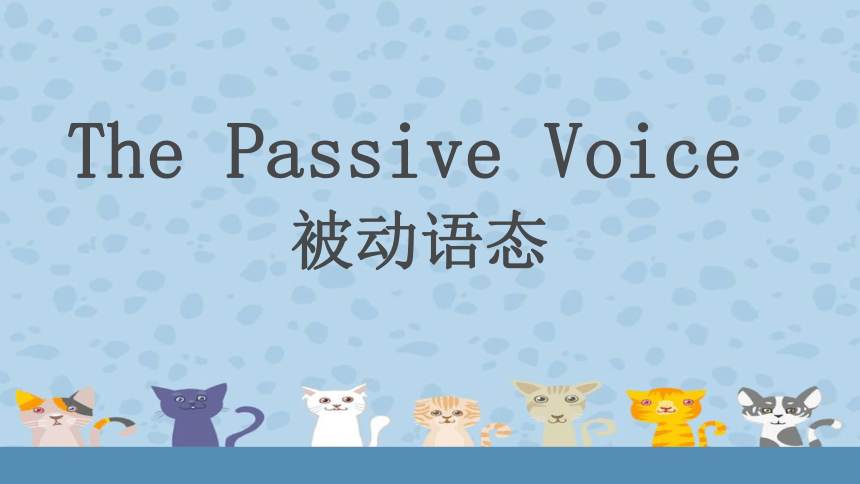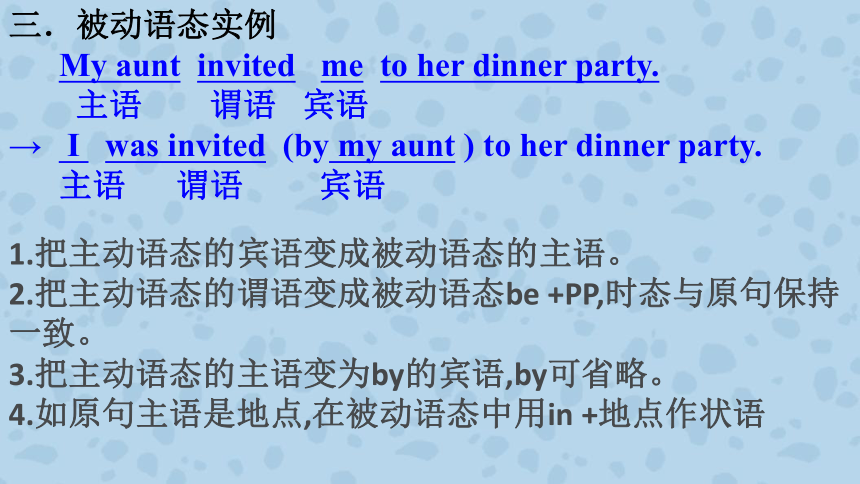2022届高考英语二轮复习:被动语态 The Passive Voice 课件(25张)
文档属性
| 名称 | 2022届高考英语二轮复习:被动语态 The Passive Voice 课件(25张) |  | |
| 格式 | pptx | ||
| 文件大小 | 751.6KB | ||
| 资源类型 | 教案 | ||
| 版本资源 | 通用版 | ||
| 科目 | 英语 | ||
| 更新时间 | 2021-11-04 16:18:19 | ||
图片预览









文档简介
(共24张PPT)
The Passive Voice
被动语态
英语动词有两种语态,主动语态和被动语态。
主动语态表示主语是动作的执行者,被动语态表示主语是动作的承受者
They will build a new bridge over the river. (主动)
A new bridge will be built over the river. (被动)
汉语中常用“被”、“给”、“由”、“受等词用来表示被动,而英语用:
助动词be + 及物动词的过去分词构成。
二.构成:be动词+及物动词过去分词 ----- be+PP
(past participle)
三.被动语态实例
My aunt invited me to her dinner party.
主语 谓语 宾语
→ I was invited (by my aunt ) to her dinner party.
主语 谓语 宾语
1.把主动语态的宾语变成被动语态的主语。
2.把主动语态的谓语变成被动语态be +PP,时态与原句保持一致。
3.把主动语态的主语变为by的宾语,by可省略。
4.如原句主语是地点,在被动语态中用in +地点作状语
被打的豆豆
在遥远的小岛上,住着一个倒霉蛋,它叫豆豆,那里的人只有三件事要忙,吃饭,睡觉,打豆豆。
你看,它总是被打,还不知道是谁打的。
Doudou is always beaten by someone.
昨天晚上,夜黑风高,它又被打了。
Doudou was beaten yesterday evening.
明天,豆豆还会面临n顿暴打,可怜的豆豆啊。
Tomorrow, Doudou will be beaten several times.
可怜的豆豆,已经被这样打了很多年,命运一直没有改变。
Poor Doudou has been beaten for many years.
我们亲爱的豆豆现在在干嘛,不用问,一定是正在被打。
Our dear Doudou is being beaten now.
随时可能被打的豆豆,谁来救救它啊。
Poor Doudou may be beaten anytime.
The end
四. 各种时态下的被动语态
时态变化主要体现在be的变化上,以 do 为例,列表如下:
一般现在时: am / is / are +done
一般过去时: was / were/ +done
一般将来时: shall / will + be +done
过去将来时: should/would + be + done
现在进行时: am / is / are + being + done
过去进行时: was / were + being + done
现在完成时:have / has + been + done
过去完成时:had + been + done
将来完成时: shall /will + have been + done
过去将来完成时:should/would + have been + done
将来完成时是用在表示在将来某一时间以前已经完成或一直持续的动作。
过去将来完成时表示从过去观点看将来某时某动作已完成。
[1]. Now English ____ by more and more people all over the word.
A. speaks
B. is spoken
C. was spoken
一般现在时的被动语态:
am / is / are + PP
[2]. The lost boy ____ at the street corner last night.
A. was found
B. is found
C. was looked for
一般过去时的被动语态:
was / were + PP
[3]. A new supermarket ____ here next year.
A. will build
B. will be built
C. was built
一般将来时的被动语态:
will + be + PP
be going to + be + PP
[4]. Three hotels ____ since last year.
A. have built
B. were built
C. have been built
现在完成时的被动语态:
have / has + been + PP
[5]. Flowers ____ every day.
A. has been watered
B. should be watered
C. should water
含有情态动词的被动语态:
情态动词 + be + PP
[6]. Children should ___.
A. take good care of
B. be taken good care
C. be taken good care of
固定短语的被动不要丢掉后面的介词或副词
[7]. Your desk ___.
A. needs repair
B. needs repairing
C. needs to repair
need, allow 可以用-ing形式表示被动
need to be done = need doing
be allowed to do = allow doing
(1) 含有双宾语的被动语态
含有双宾语的句子,主动句中的间接宾语或直接宾语都可变为被动语态中的主语,另一个保留不变。
变为主语的若是主动句中的直接宾语,间接宾语前则需加介词to 或 for。
例如:The pianist gave the pupils some advice.
间接宾语 直接宾语
→The pupils were given some advice by the pianist.
→Some advice was given to the pupils by the pianist.
(2) 主动表示被动
1.有些动词既是vt又是vi:
write, read, clean, sell, wash, cook等
2.当和well, badly, easily等副词连用时
3.表主语内在品质特征
4.句子短小精悍,主动表被动。
The cloth washes easily.
The new product sells well.
The pen writes smoothly.
The meat didn’t cook well.
对比: The books sell well. (主动句)
The books were sold out. (被动句)
The meat didn’t cook well. (主动句)
The meat was cooked for a long time. (被动句)
主动语态变被动语态
换
变
改
加
主语和宾语互换
变化谓语动词be
改动词 → done
宾语前加 by
4步走
Exercises
They clean the room every day.
He lost two books yesterday.
She has turned on the computer already.
People are building a new bridge now.
She will sell her house soon.
He has finished his work.
You should invite more people to come.
He is going to see the film tomorrow.
Thank you!
The Passive Voice
被动语态
英语动词有两种语态,主动语态和被动语态。
主动语态表示主语是动作的执行者,被动语态表示主语是动作的承受者
They will build a new bridge over the river. (主动)
A new bridge will be built over the river. (被动)
汉语中常用“被”、“给”、“由”、“受等词用来表示被动,而英语用:
助动词be + 及物动词的过去分词构成。
二.构成:be动词+及物动词过去分词 ----- be+PP
(past participle)
三.被动语态实例
My aunt invited me to her dinner party.
主语 谓语 宾语
→ I was invited (by my aunt ) to her dinner party.
主语 谓语 宾语
1.把主动语态的宾语变成被动语态的主语。
2.把主动语态的谓语变成被动语态be +PP,时态与原句保持一致。
3.把主动语态的主语变为by的宾语,by可省略。
4.如原句主语是地点,在被动语态中用in +地点作状语
被打的豆豆
在遥远的小岛上,住着一个倒霉蛋,它叫豆豆,那里的人只有三件事要忙,吃饭,睡觉,打豆豆。
你看,它总是被打,还不知道是谁打的。
Doudou is always beaten by someone.
昨天晚上,夜黑风高,它又被打了。
Doudou was beaten yesterday evening.
明天,豆豆还会面临n顿暴打,可怜的豆豆啊。
Tomorrow, Doudou will be beaten several times.
可怜的豆豆,已经被这样打了很多年,命运一直没有改变。
Poor Doudou has been beaten for many years.
我们亲爱的豆豆现在在干嘛,不用问,一定是正在被打。
Our dear Doudou is being beaten now.
随时可能被打的豆豆,谁来救救它啊。
Poor Doudou may be beaten anytime.
The end
四. 各种时态下的被动语态
时态变化主要体现在be的变化上,以 do 为例,列表如下:
一般现在时: am / is / are +done
一般过去时: was / were/ +done
一般将来时: shall / will + be +done
过去将来时: should/would + be + done
现在进行时: am / is / are + being + done
过去进行时: was / were + being + done
现在完成时:have / has + been + done
过去完成时:had + been + done
将来完成时: shall /will + have been + done
过去将来完成时:should/would + have been + done
将来完成时是用在表示在将来某一时间以前已经完成或一直持续的动作。
过去将来完成时表示从过去观点看将来某时某动作已完成。
[1]. Now English ____ by more and more people all over the word.
A. speaks
B. is spoken
C. was spoken
一般现在时的被动语态:
am / is / are + PP
[2]. The lost boy ____ at the street corner last night.
A. was found
B. is found
C. was looked for
一般过去时的被动语态:
was / were + PP
[3]. A new supermarket ____ here next year.
A. will build
B. will be built
C. was built
一般将来时的被动语态:
will + be + PP
be going to + be + PP
[4]. Three hotels ____ since last year.
A. have built
B. were built
C. have been built
现在完成时的被动语态:
have / has + been + PP
[5]. Flowers ____ every day.
A. has been watered
B. should be watered
C. should water
含有情态动词的被动语态:
情态动词 + be + PP
[6]. Children should ___.
A. take good care of
B. be taken good care
C. be taken good care of
固定短语的被动不要丢掉后面的介词或副词
[7]. Your desk ___.
A. needs repair
B. needs repairing
C. needs to repair
need, allow 可以用-ing形式表示被动
need to be done = need doing
be allowed to do = allow doing
(1) 含有双宾语的被动语态
含有双宾语的句子,主动句中的间接宾语或直接宾语都可变为被动语态中的主语,另一个保留不变。
变为主语的若是主动句中的直接宾语,间接宾语前则需加介词to 或 for。
例如:The pianist gave the pupils some advice.
间接宾语 直接宾语
→The pupils were given some advice by the pianist.
→Some advice was given to the pupils by the pianist.
(2) 主动表示被动
1.有些动词既是vt又是vi:
write, read, clean, sell, wash, cook等
2.当和well, badly, easily等副词连用时
3.表主语内在品质特征
4.句子短小精悍,主动表被动。
The cloth washes easily.
The new product sells well.
The pen writes smoothly.
The meat didn’t cook well.
对比: The books sell well. (主动句)
The books were sold out. (被动句)
The meat didn’t cook well. (主动句)
The meat was cooked for a long time. (被动句)
主动语态变被动语态
换
变
改
加
主语和宾语互换
变化谓语动词be
改动词 → done
宾语前加 by
4步走
Exercises
They clean the room every day.
He lost two books yesterday.
She has turned on the computer already.
People are building a new bridge now.
She will sell her house soon.
He has finished his work.
You should invite more people to come.
He is going to see the film tomorrow.
Thank you!
